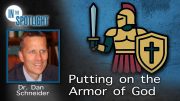CBS News reported on November 11 that Pope Benedict is considering the possibility of extraterrestrial life, which is an attempt to bridge the gap between science and religion. This news story came five days after a report by the Pew Research Center on November 6 called the “Paradoxical Relationship of Religion and Science.”
But what’s paradoxical about religion and science? The connection between Christianity and Science has always been robust. As Rodney Stark points out in his book, The Victory of Reason, Christian faith is the virtual cornerstone of modern science.
“The questions of life’s origins and of whether life exists elsewhere in the universe are very suitable and deserve serious consideration,” said Rev. Jose Gabriel Funes, who is an astronomer and director of the Vatican Observatory. “Just as there is a multitude of creatures on Earth, there could be other beings, even intelligent ones, created by God. This does not contradict our faith, because we cannot put limits on God’s creative freedom.”
This is not a change in Christian thought. C.S. Lewis, another great Christian academician, wrote the science fiction masterpiece Out of the Silent Planet as a story that explicitly includes aliens and space travel. Both the CBS News story and the Pew Research report assume that there has been an historical hostility between Christian faith and the frontiers of science, with the Trial of Galileo often cited as evidence of that (as it was in both the CBS News story and the Pew Research report).
In fact, Galileo was not punished for religious heresy in his notorious trial but for academic malfeasance. The academicians in the Catholic Church who prosecuted him objected to Galileo stating as scientific fact that the sun was at the center of the universe; no Catholic professors or clerics objected to his assertion as a theory that the sun was at the center of the universe and that the planets revolved around the sun as Copernicus suggested.
These churchmen, of course, were absolutely right and Galileo was absolutely wrong. We do not live in a geocentric universe or a heliocentric universe. The most advanced cosmologists can only give us an educated guess as to where the center of the universe lies. The church’s acceptance of several theories of the structure of the universe was actually more open and more consistent with alien life than Galileo’s (inaccurate) insistence that the sun was the center of the universe.
Galileo was also wrong about the movement of the planets around the sun. He accepted the Copernican theory of the planets moving in circles around the sun. Kepler, like Galileo and Copernicus another devout Christian, later calculated the actual irregular orbits of the planets around the sun. Interestingly, even Galileo acknowledged intellectual holes in his theory. Christianity encouraged creative scientific thought.
More than three centuries before the trial of Galileo Etienne Tempier, the Bishop of Paris, specifically argued that God could have created multiple worlds with alien life forms. In the century before Galileo, Cardinal Nicholas, a scientific genius who profoundly influenced Galileo, hypothesized the possibility of alien life on the moon and on the sun. Copernicus, another great influence on Galileo, was not only a canon of the Catholic Church, but he was supported and encouraged by churchmen in his heliocentric theory. The leaders of science, not the suppressors of science, were very devout Christians.
The Pew Report also cites the Anglican Church’s opposition to evolution by natural selection as an example of the conflict between faith and Christianity. The arguments made against evolution by random chance, which is the basis of Intelligent Design, were not made in Darwin’s day by ignorant Christians relying upon scriptures, but by very intelligent scientists of devout faith who argued, very persuasively, that the random generation of life through natural selection was full of gaping intellectual flaws.
Sir Fred Hoyle, one of the greatest cosmologists of all time, worked out a few decades ago the statistical impossibility of life evolving from natural selection. Hoyle joined an increasingly long line of biologists, cosmologists, and anthropologists who have, reluctantly, concluded that Darwin’s intrinsically atheistic model of evolution simply does not work, particularly as the incredible complexity of life (which was presumed to be much simpler in Darwin’s day) is understood.
The Christian worldview understands a rational and discoverable universe. Since those first human engines of scientific inquiry, the Medieval universities, that perspective has guided science into the discoveries of genetics (Father Mendel), entropy and Chaos Theory (Lord Kelvin), Quantum Theory (Max Planck), Electromagnetic Theory (James Clark Maxwell), and countless other revolutions in scientific thought.
There is no paradox between thoughtful men of faith and a rational, scientific understanding of our universe. There is, instead, only a perceived paradox. Why does this exist? Faith is the strongest bulwark against a materialist ideological world-view that sanctions coercive eugenics, scientific Marxism, racial “science,” and other terrors of modern life. Destroy faith, as Nazis and Bolsheviks urged, and the final restraint on human evil can be dismissed as simply superstitious opinion.




